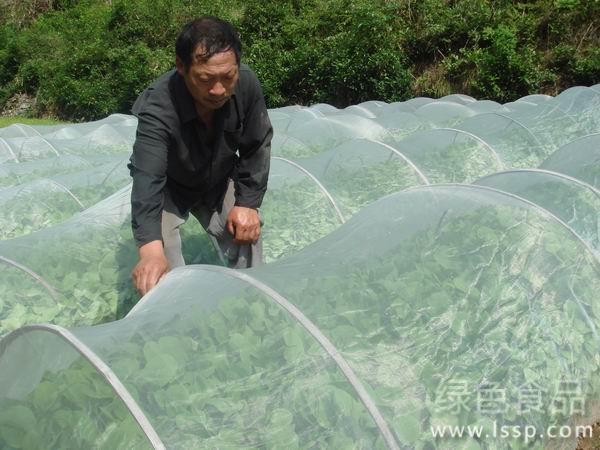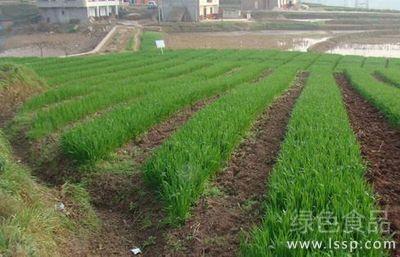Key points of vegetable cultivation techniques covered with insect net

Anti-insect net mulching cultivation
Anti-insect net mulching cultivation is one of the important measures for pollution-free production of agricultural products, which is of great significance for no or less use of chemical pesticides, reduction of pesticide pollution, production of pesticide-free, pollution-free and pollution-free vegetables.
I. form of coverage
Covered by the greenhouse, the insect-proof net can be directly covered on the scaffolding, compacted with soil or brick around, fastened with film thread between the shed pipe (frame), leaving the main door of the greenhouse to uncover, so as to facilitate the operation of the shed.
Covered by a small arch shed, the insect-proof net can be covered on the top of the arch frame, and the surrounding cover is strict, and then the water will be poured directly on the net until the harvest, and the full closed cover will be carried out.
The horizontal scaffolding is covered, and all the vegetable fields around the 1hm2 are covered with an anti-insect net, which saves the anti-insect net and net frame, and is easy to operate.
Second, coverage effect
1) adjust the air temperature and ground temperature. According to the experiment, under the 25-mesh white insect control net, the temperature in the greenhouse was the same as that in the open field in the morning and evening, but under the condition of high temperature in sunny day and noon, the temperature in the net was about 1 ℃ higher than that in the open field. The 10cm ground temperature in the greenhouse was higher than that in the open field in the morning and evening, but lower than that in the open field at noon.
2) shading and humidification. The shading rate of 25-mesh white insect-proof net is 15% Mur25%, which is lower than that of sunshade net and agricultural film. Silver gray anti-insect net is 37%, grey anti-insect net can reach 45%. Covered with insect prevention net, the air humidity in the morning is higher than that in the open field, and it is lower than that in the open field at noon and evening. The relative humidity in the net is about 5% higher than that in the open field, and nearly 10% higher after watering, which is especially suitable for cultivation in summer and autumn.
3) Anti-frost and anti-freezing. From late March to early April, the temperature in the shed covered with insect-proof net is 1 / 2 ℃ higher than that in the open field, and the ground temperature in 5cm is 0.5-1 degree higher than that in the open field, which can effectively prevent frost.
4) prevent rainstorm and strong wind. Strong winds and torrential rains in summer will cause mechanical damage to vegetables, cause soil consolidation, and cause seedling collapse and seedling death. After covering the anti-insect net, due to the small mesh and high intensity, the rainstorm fell into a drizzle after the impact of the anti-insect net, and the impact was weakened, which was beneficial to the growth of vegetables. According to the measurement, under the 25-mesh insect control net, the wind speed in the greenhouse is 15% lower than that in the open field. Under the 30-mesh anti-insect net, the wind speed is reduced by 20% Mur25%, so the anti-insect net has a better anti-strong wind effect.
5) prevent insect and virus diseases. After covering the insect control net, it can basically avoid the damage of many kinds of pests, such as cabbage worm, diamondback moth, cabbage armyworm, beetle, bean borer, melon silk borer, yellow striped beetle, ape leaf beetle, 28 ladybug, aphid, Liriomyza huidobrensis and other pests, and control the occurrence of virus diseases caused by the spread of pests.
6) increase production and income and improve quality. According to the experiment, the yield covered with 25-mesh white anti-insect net greenhouse is the highest, which can increase by about 30%; the green vegetables in the net have less pesticide pollution, no insect eyes, clean and less mud, and the harvest time is 4-5 days earlier than that in the open field, and the commodity is good.
7) protect natural enemies. The living space composed of anti-insect net provides an ideal habitat for the activities of natural enemies without causing natural enemies to escape to the outer space, which creates favorable conditions for the application and promotion of biological pest control technology.
III. Scope of application
1) leafy vegetables. Mainly used in Chinese cabbage, summer Chinese cabbage, summer and autumn cabbage, spinach, lettuce, cauliflower, radish production. There are many insect pests and serious pesticide pollution in the open field production of this kind of vegetables.
2) eggplant fruits. This kind of vegetables are prone to virus diseases in summer and autumn. Insect prevention nets block the transmission of pests and reduce the transmission of virus diseases. At the same time, cotton bollworm, Spodoptera litura, 28-star ladybug, eggplant yellow borer and so on were isolated to reduce rotten fruit.
3) melons. It is mainly used in melon, pumpkin, watermelon and so on, which is helpful to reduce the occurrence of virus disease and the harm of Huangshou melon, melon silk borer and so on.
4) legumes. The control effect of insect control net on pod borer and Liriomyza huidobrensis is more than 95%. It can also increase chlorophyll content, increase leaf area and enhance root activity.
5) raising seedlings. June to August every year is the season of raising vegetable seedlings in autumn, which is the period of high temperature, rainstorm and frequent insect pests, so it is difficult to raise seedlings. After using anti-insect net, the emergence rate of vegetables is high, the survival rate is high, and the quality of autumn seedlings is good, which wins the initiative of vegetable production in autumn and winter.
6) seed production and propagation of vegetables. Insect control net can prevent interspecies hybridization caused by insect activities, resulting in seed hybrid degradation. It can be widely used in the seed production and propagation of vegetables.
Related
- Fuxing push coffee new agricultural production and marketing class: lack of small-scale processing plants
- Jujube rice field leisure farm deep ploughing Yilan for five years to create a space for organic food and play
- Nongyu Farm-A trial of organic papaya for brave women with advanced technology
- Four points for attention in the prevention and control of diseases and insect pests of edible fungi
- How to add nutrient solution to Edible Fungi
- Is there any good way to control edible fungus mites?
- Open Inoculation Technology of Edible Fungi
- Is there any clever way to use fertilizer for edible fungus in winter?
- What agents are used to kill the pathogens of edible fungi in the mushroom shed?
- Rapid drying of Edible Fungi



